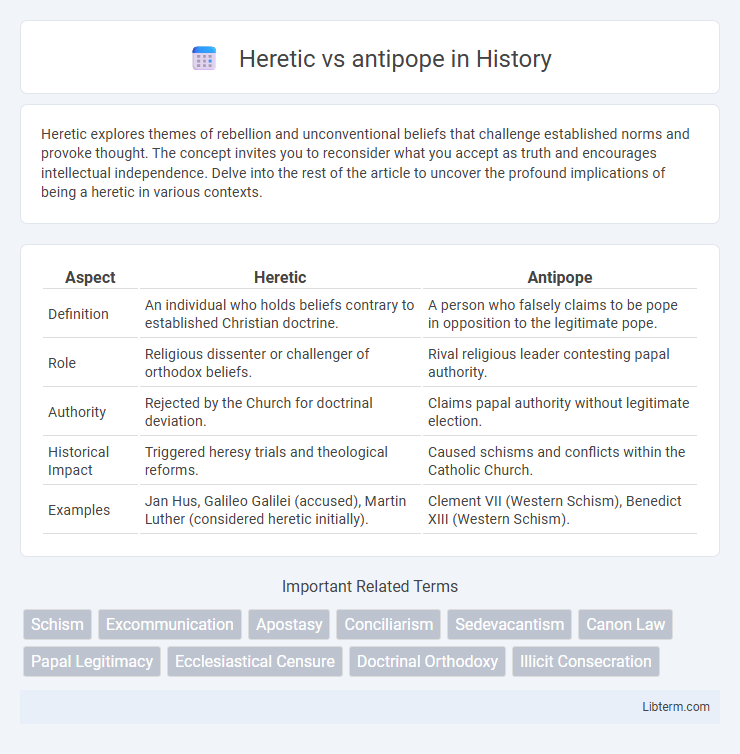Heretic explores themes of rebellion and unconventional beliefs that challenge established norms and provoke thought. The concept invites you to reconsider what you accept as truth and encourages intellectual independence. Delve into the rest of the article to uncover the profound implications of being a heretic in various contexts.
Table of Comparison
| Aspect | Heretic | Antipope |
|---|---|---|
| Definition | An individual who holds beliefs contrary to established Christian doctrine. | A person who falsely claims to be pope in opposition to the legitimate pope. |
| Role | Religious dissenter or challenger of orthodox beliefs. | Rival religious leader contesting papal authority. |
| Authority | Rejected by the Church for doctrinal deviation. | Claims papal authority without legitimate election. |
| Historical Impact | Triggered heresy trials and theological reforms. | Caused schisms and conflicts within the Catholic Church. |
| Examples | Jan Hus, Galileo Galilei (accused), Martin Luther (considered heretic initially). | Clement VII (Western Schism), Benedict XIII (Western Schism). |
Understanding the Terms: Heretic and Antipope
Heretic refers to an individual who holds beliefs or teachings that deviate from established orthodox doctrines of a religion, often leading to condemnation by religious authorities. An antipope is a person who makes a contested claim to the papacy in opposition to the legitimate pope, typically during periods of schism within the Catholic Church. Understanding these terms requires recognizing that heresy pertains to doctrinal errors, while an antipope involves a disputed ecclesiastical authority.
Historical Contexts of Heresy and Antipapacy
Heresy and antipapacy emerged as significant challenges to ecclesiastical authority during the Middle Ages, reflecting deep theological and political conflicts within Christianity. Heretics, such as the Cathars and Lollards, were condemned for deviating from orthodox doctrines, threatening church unity and prompting inquisitions and councils like the Fourth Lateran Council (1215). The antipapacy crisis, exemplified by the Western Schism (1378-1417), involved rival claimants to the papal throne, undermining the papal authority and fracturing Christendom into competing obediences.
Origins and Evolution of Heresy in the Church
Heretics originate from doctrinal deviations within Christianity, often arising during the early Church as believers challenged established dogma, leading to significant theological conflicts like Arianism and Gnosticism. The evolution of heresy prompted the Church to define orthodoxy through ecumenical councils and creeds, solidifying core doctrines and excommunicating dissenters to preserve doctrinal unity. In contrast, antipopes emerged primarily from political disputes and contested papal elections, representing rival claimants to the papacy rather than doctrinal deviation, complicating Church authority but not doctrinal integrity.
The Role of Antipopes in Church History
Antipopes played a significant role in church history by challenging the legitimacy of the reigning pope, often emerging during periods of political and theological conflict. Unlike heretics, who promoted doctrines contrary to established church teachings, antipopes claimed rightful authority over the papacy, leading to schisms such as the Western Schism (1378-1417) which fragmented Christendom. Their presence highlighted the complex interplay between religious authority and political power, influencing the structure and unity of the Catholic Church for centuries.
Key Differences Between Heretics and Antipopes
Heretics are individuals who hold beliefs that deviate from established doctrinal teachings, particularly in Christianity, challenging core theological principles. Antipopes are rival claimants to the papacy, asserting a contested or illegitimate claim to the position of the pope in opposition to the recognized pontiff. The key difference lies in heretics primarily opposing doctrinal orthodoxy, whereas antipopes contest ecclesiastical authority and leadership within the Church hierarchy.
Notable Heretics: Influential Figures and Movements
Notable heretics such as Martin Luther and Jan Hus profoundly challenged Catholic orthodoxy, sparking reform movements that reshaped Christianity and questioned the papal authority symbolized by antipopes like Clement VII. The Protestant Reformation, led by Luther's 95 Theses, marked a critical shift toward religious pluralism and doctrinal disputes, while the Hussite movement exemplified early resistance to Church corruption. These influential figures and movements illuminated key theological conflicts between heresy and papal legitimacy, influencing centuries of religious, political, and cultural transformation.
Prominent Antipopes: Claimants to the Papal Throne
Prominent antipopes, such as Clement VII and Benedict XIII during the Western Schism, made significant claims to the papal throne, challenging the legitimacy of the recognized pope. These claimants often garnered substantial political and ecclesiastical support, complicating the Catholic Church's efforts to maintain unity and authority. Unlike heretics, who deviated from church doctrine, antipopes specifically contested the rightful succession of papal authority, causing prolonged schisms and divisions within the Church.
Church Responses: Doctrine, Schism, and Authority
Church responses to heretics and antipopes fundamentally differ in doctrine, schism, and authority. Heretics challenge established doctrines by promoting beliefs contrary to Church teachings, prompting formal condemnations and excommunications to preserve theological orthodoxy. Antipopes, as rival claimants to the papal office, provoke schisms by undermining papal authority and unity, leading the Church to mobilize councils and loyal bishops to reaffirm legitimate pontiffs and restore ecclesiastical order.
Lasting Impact on Catholicism and Christianity
Heretics and antipopes both significantly shaped Catholicism and Christianity, often catalyzing doctrinal clarifications and church reforms. Heretical movements prompted the Church to define orthodox beliefs more precisely, solidifying dogmas like the Nicene Creed and influencing councils such as Nicaea and Trent. Antipopes, through schisms and rival claims to the papacy, challenged ecclesiastical authority, leading to the development of stronger papal legitimacy and centralized Church governance.
Modern Perspectives on Heresy and Antipapacy
Modern perspectives on heresy emphasize the distinction between theological error and schismatic actions, while the antipapacy is viewed primarily through the lens of ecclesiastical legitimacy and authority disputes. Contemporary scholars analyze heretics as those rejecting core doctrines, whereas antipopes are recognized as rival claimants to the papal office challenging the recognized pontiff's legitimacy. This nuanced understanding influences current theological, historical, and canonical studies on Church unity and doctrinal integrity.
Heretic Infographic

 libterm.com
libterm.com